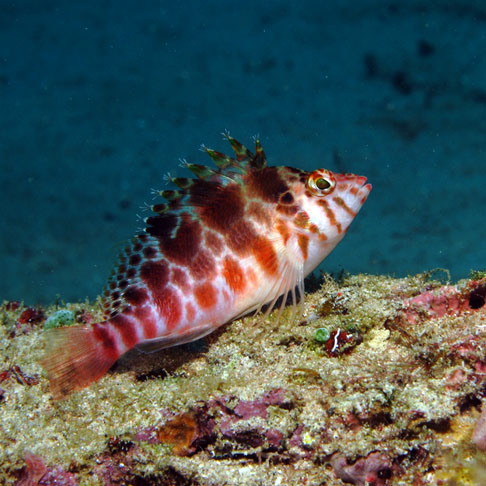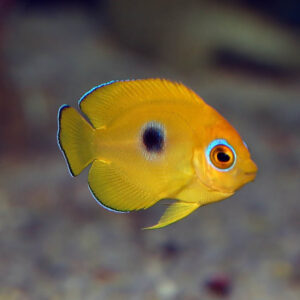The Pixy Spotted Hawkfish (Cirrhitichthys aprinus) is a visually striking fish with vibrant colours and elaborate patterns. It has an elongated body with a maximum size of around 4 to 5 inches (10 to 13 cm). The body is white with red patches covering its entire body, including the dorsal fin.
Taxonomy
The Pixy Spotted Hawkfish belongs to the genus Cirrhitichthys within the family Cirrhitidae. It is scientifically classified as Cirrhitichthys aprinus. Its alternative named rock hopper
Natural Habitat
In their natural habitat, Pixy Spotted Hawkfish are found in coral reefs, rocky areas, and crevices. They are often observed perching on coral branches or hiding among rocks, using their pectoral fins to anchor themselves. They prefer areas with moderate to strong water currents.
Keeping the Pixy Spotted Hawkfish Healthy
The Pixy Spotted Hawkfish requires a moderate level of care and is suitable for intermediate-level aquarists. Providing a well-maintained aquarium with stable water parameters is essential for their health. Regular monitoring of water temperature, salinity, and quality is recommended.
Special Requirements and Feeding
Pixy Spotted Hawkfish are carnivorous and should be fed a varied diet of live or frozen meaty foods. They have a small mouth and prefer smaller-sized foods such as brine shrimp, mysis shrimp, and other small marine invertebrates. Offering a diverse diet ensures they receive the necessary nutrients for their overall well-being.
How Many Should I Keep?
The Pixy Spotted Hawkfish is typically kept as a solitary fish. They are territorial and may become aggressive towards other hawkfish or similar-sized species if kept in close proximity.
Lighting Preference
Pixy Spotted Hawkfish do well under moderate to high-intensity lighting, mimicking the bright conditions of their natural reef habitat.
Suitable Tank Mates
When selecting tank mates for Pixy Spotted Hawkfish, it is important to choose species that are compatible with their semi-aggressive nature. They may exhibit territorial behaviour, especially towards smaller fish or those with similar body shapes. Peaceful, larger-sized fish that can hold their ground can be suitable tank mates.
Reproduction in the Wild
The reproductive behaviour of the Pixy Spotted Hawkfish (Cirrhitichthys aprinus) in the wild is not well-documented. However, like other hawkfish species, they are believed to be oviparous, which means they lay eggs. Reproduction likely occurs through external fertilization, where the female releases her eggs into the water column and the male fertilizes them with his sperm.
Breeding Cirrhitichthys aprinus
Breeding the Pixy Spotted Hawkfish in captivity is challenging and not commonly reported. However, if successful, the following steps may be followed:
- Set Up:
Create a well-maintained breeding tank with appropriate water conditions. The tank should provide suitable hiding places and structures for the fish to lay their eggs on, such as coral branches or artificial spawning sites.
- Courtship/Spawning:
Encourage courtship behaviour by providing appropriate environmental cues, such as increasing water temperature and providing a natural photoperiod. The male may display territorial behaviour and court the female, which can include flaring fins and changing colours. Spawning occurs when the female releases her eggs and the male fertilizes them.
- Rearing:
After spawning, the eggs need to be carefully monitored and removed from the main tank to prevent predation. They can be placed in a separate rearing tank with appropriate water parameters, including temperature and salinity matching the adult tank. Feeding the fry with small live foods, such as rotifers and newly hatched brine shrimp, is crucial for their survival and growth.
Sexual Dimorphism
There is limited information on sexual dimorphism in the Pixy Spotted Hawkfish. However, it is generally believed that there are no significant differences in appearance between males and females in terms of coloration or size.
Distribution
The Pixy Spotted Hawkfish, Cirrhitichthys aprinus, is naturally distributed in the Indo-Pacific region, including the Red Sea, East Africa, the Maldives, and the Pacific Islands. They are not known to be a captive-bred or line-bred strain, and the original fish are sourced from their wild populations.
Summary
The Pixy Spotted Hawkfish (Cirrhitichthys aprinus) is a captivating fish known for its vibrant colours and unique patterns. Their reproduction in the wild involves external fertilization, with the female releasing eggs and the male fertilizing them. Breeding them in captivity is challenging but may involve creating suitable breeding conditions, promoting courtship behaviour, and providing appropriate care for the eggs and fry. They are distributed in the Indo-Pacific region and are not typically captive-bred. Overall, the Pixy Spotted Hawkfish adds beauty and intrigue to marine aquariums but requires careful attention and expertise due to their delicate nature.





Reviews
There are no reviews yet.